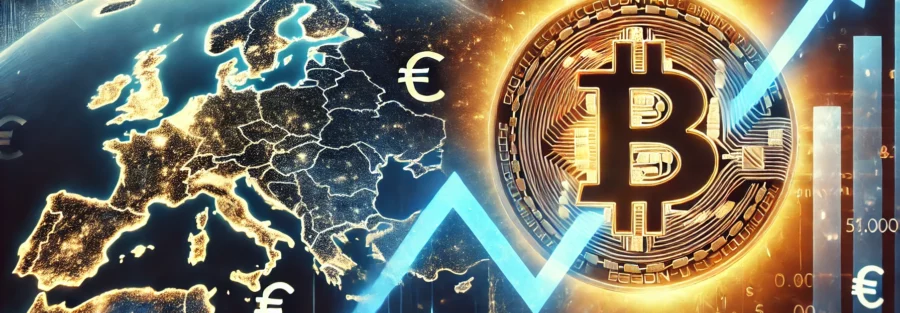The euro remained under pressure on Thursday following the anticipated collapse of the French government, raising concerns about the stability of the region’s second-largest economy. Meanwhile, Bitcoin surged past $100,000 for the first time.
The cryptocurrency has experienced a significant rally since November, driven by expectations that Donald Trump’s U.S. election victory will create a more favorable regulatory environment for digital currencies.
Bitcoin climbed to a peak of $103,619 during Asian trading hours and was last up more than 4% at $102,162, marking a 140% increase in its year-to-date value.
Kyle Rodda, senior financial market analyst at Capital.Com, commented, “There’s reason to believe Bitcoin’s momentum could continue. With reduced regulatory risks, growing appeal of non-fiat assets due to concerns over U.S. fiscal policy, and increasing geopolitical risks, there are factors supporting further price growth.”
Meanwhile, the euro rose 0.18% to $1.052775 but remained near its two-year low of $1.03315, reached at the end of November, as markets brace for a prolonged political crisis in France.
French lawmakers passed a no-confidence vote against the government on Wednesday, deepening the crisis and further undermining the country’s ability to pass legislation and address its large budget deficit.
ING economist Charlotte de Montpellier explained, “The government’s collapse means political uncertainty will continue to weigh on both business and consumer confidence. Finding a new prime minister who won’t face immediate challenges will be extremely difficult, so France may remain without a government for weeks, if not months.” When asked whether the European Central Bank (ECB) would intervene to support France if market turmoil worsens, ECB President Christine Lagarde only stated that financial stability is an important factor in maintaining price stability.
During a parliamentary session on Wednesday, Lagarde also noted that economic growth in the euro zone could slow in the coming months, with downside risks dominating the medium-term outlook.
Market expectations are almost certain that the ECB will reduce interest rates next week, with traders pricing in 157 basis points of cuts by the end of 2025.
In Asia, the Japanese yen gained over 0.5%, rising to 149.80 per dollar, as traders speculated whether the Bank of Japan (BOJ) would raise interest rates later this month.
There had been growing expectations that the BOJ would hike rates at its Dec. 18-19 meeting, supported by comments from Governor Kazuo Ueda. However, reports published on Wednesday suggested the BOJ may hold off on a rate increase this month, casting doubt on those predictions.
BOJ board member Toyoaki Nakamura remarked on Thursday that the central bank must proceed “cautiously” in raising rates.
Meanwhile, the South Korean won remained steady after the country’s finance ministry announced it would activate 40 trillion won ($28.35 billion) in market stabilization funds, following the turmoil triggered by President Yoon Suk Yeol’s declaration and subsequent reversal of martial law.
South Korean lawmakers have proposed impeaching Yoon over the crisis, which has shaken global markets. The won remains near its two-year low against the dollar and is the worst-performing Asian currency this year, last standing at 1,414.41 per dollar.





